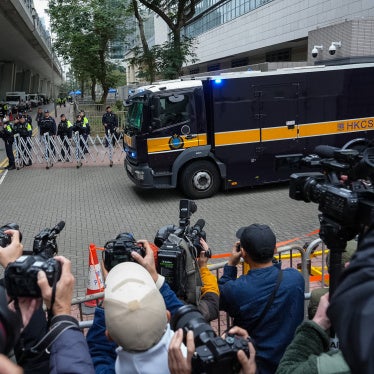Rt Hon Tony Blair MP
10 Downing St
Whitehall
London SW1
Re: Beating of Lu Banglie in China
Dear Prime Minister,
We write to urge that you and the United Kingdom government immediately press the Chinese government at the highest levels regarding the vicious beating of Lu Banglie on October 8, 2005 in Taishi village, Guangdong province, and to prosecute those responsible.
This attack happened in the presence of Benjamin Joffe-Walt of The Guardian and made front-page news. It is a rare case of its type in which the perpetrators are known to the international community. It should be seen as a test for the Chinese leadership of their stated commitment to the rule of law and human rights. The Chinese government must act quickly to arrest the perpetrators and prosecute them in a fair trial open to the public.
Lu Banglie is an activist and village chief, having successfully unseated the long-standing Party-supported incumbent in his home village. Taishi villagers had asked him for advice in their legal attempts to unseat their chief, who, they said, led effort to sell their land and embezzle the proceeds. Last month, in part thanks to Mr. Lu’s efforts, villagers succeeded in forcing a recall election. The official People’s Daily hailed the effort as a “model for village self-rule.” These local elections are the centerpiece of what China’s leaders refer to as “grassroots democracy.”
However, on October 8, Mr. Lu accompanied Mr. Joffe-Walt, an accredited journalist, to look into allegations of human rights abuses and other events in Taishi. In the run-up to the election there had been reports of:
- official protection for gangs of thugs organized to harass and intimidate other journalists, a lecturer, two lawyers, and local villagers;
- the use of force against villagers who had been guarding the village records in Taishi;
- the arrest for speaking at a local rally and subsequent hunger strike of a Beijing lawyer, Yang Maodong, referred to in press reports as Guo Feixiong, who was hired by villagers to represent them––Guangdong authorities charged him with disturbing the peace;
- official orders to Chinese newspapers to refrain from reporting on events in Taishi or the number, names, and whereabouts of detained villagers; and
- the September 30 shutdown of Yannan, an online forum popular with academics, journalists, and rights advocates that had publicized and commented on events such as villagers’ initial success in defeating a government-chosen election committee.
Mr. Lu’s beating took place in front of many witnesses. Mr. Joffe-Walt reported that the apparent ringleader later sat across the table from him and others in his group when local officials attempted to smooth over the incident, making it clear that he enjoys the protection of the state.
Instead of apologizing for the attack or pledging to take legal action against the perpetrators, China’s Foreign Ministry blamed the journalist, stating: “We express regret over these journalists repeatedly breaching relevant rules to carry out such reporting activities, especially when some media are always criticizing China for the lack of laws.”
Local authorities also insisted to the journalist, an assistant, and the taxicab driver that journalists were the ones flouting Chinese law. The local propaganda department insisted that no violence had occurred. Provincial officials said “it was too early to respond to requests for a full investigation.”
We appreciate the prompt expression of concern by U.K. officials. However, we believe that without a public statement and private diplomacy by the U.K. and other governments at the highest levels, the Chinese government will do nothing. We also urge you, in your capacity as president of the E.U., to issue a public statement and undertake private diplomacy on behalf of all 25 E.U. member states. Otherwise, the incident will soon be forgotten, just one of too many cases for the international community to keep up with.
One reason we fear Chinese inaction is that in recent years the United Kingdom and others have shifted the focus of their relations with China from human rights to trade, the increasing economic power of China, and common foreign policy goals. This has sent a dangerous signal to China’s leaders, who worry less and less about how the human rights situation in China will affect its relations with other states. But the human rights situation in China––the lack of democracy, imprisonment for peaceful expression, arbitrary detentions, torture, and the type of thuggery experienced by Mr. Lu––remains one of the most salient features of life for average Chinese.
Now is a good time for a return to plain public speaking by you and other government officials on human rights issues in China. A successful prosecution of those who carried out the attack on Mr. Lu and those who ordered it––which will likely implicate government and Party officials––would be an important step forward in China.
This is a test not only of China, but a test of the commitment of the United Kingdom and others to once again making improvement of the human rights situation in China of the highest priority. We note that you will be meeting President Hu Jintao when he visits the U.K. on November 8-10. We urge you to raise Mr. Lu’s case and to demand prompt, appropriate, and public action.
Yours Sincerely,
Brad Adams
Executive Director
Asia division
cc: Foreign Secretary Jack Straw







